Most jobs call these interviews. When you’re a private chef, it’s a trial. Aka a full-on, live cooking interview where your food (and vibe) are being evaluated by the people who might hire you.
In the short two years I’ve been private cheffing (mostly) full-time, I’ve racked up a couple dozen of these trials. Some led to jobs, others didn’t. But all of them taught me something about how to show up, do the damn thing, and *ideally* leave with a job offer.
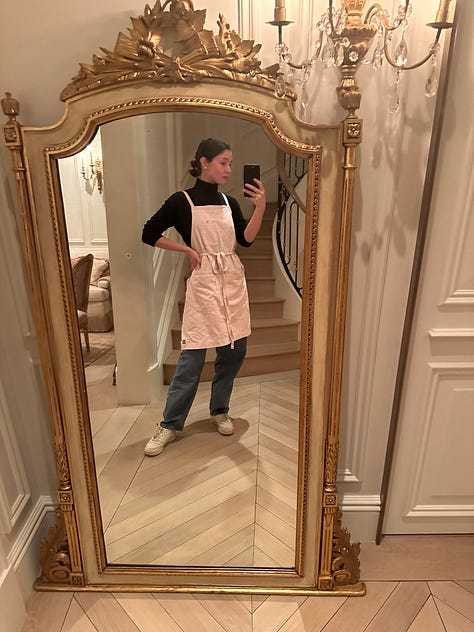
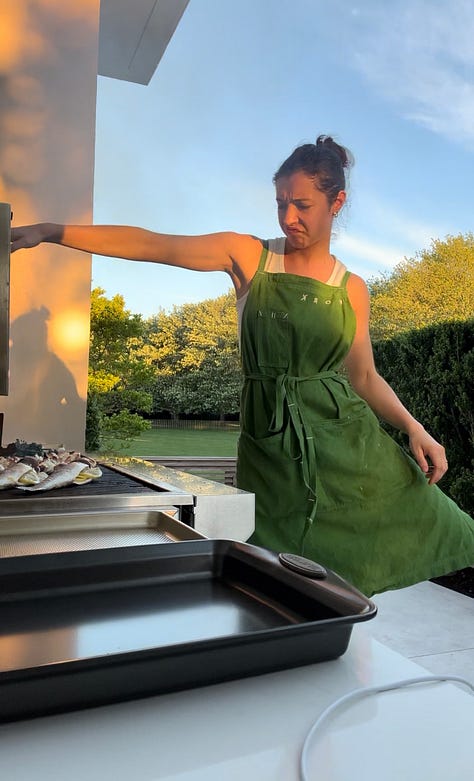
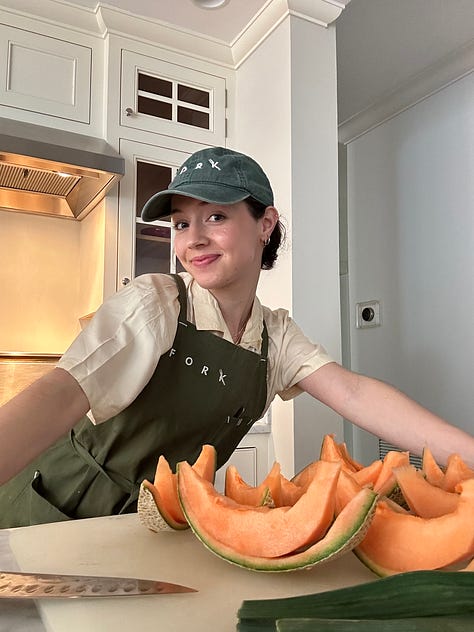
Leading up to the Trial
Build a Menu to Your Advantage
If the client gives you free rein to design a trial menu… Congrats! You’re in the driver’s seat.
Create dishes that showcase your breadth of skills while still being recipes you’ve actually made before and are confident in. This is the time to flex your strengths, not your stress tolerance.
Sometimes clients will request a specific dish or theme (yes the word’s "‘Ibiza is our happy place… can you do an Ibiza-themed menu?” came out of a client’s mouth), and when that happens, I’ll suggest a few dishes within that category that I know I can pull off confidently.
State Your Rate. Yes, Even for Trials.
You should be paid for your trial, regardless of whether you are hired after. Period. I usually charge a flat fee (which covers my labor + service), plus reimbursement for groceries and supplies. Make this super clear upfront so there are no weird conversations later.
Confirm the Kitchen Situation
Ask what kind of stove they have. Gas? Electric? Induction? It may seem like overkill, but I also like to double check about the pots and pans situation too. Do they have stainless steel or are we dealing with non-stick that’s seen better days? If you’re not sure, throw your favorite sauté pan in your tote. I’ve shamelessly arrived a pan (or two) in tow before.
Ask What’s Expected Beyond Cooking
Will you be setting the table? Plating buffet-style or family-style or individually? Cleaning up solo or with help? The more you know ahead of time, the smoother the night will go. Every house has its own rhythm, and it’s better to ask than assume.
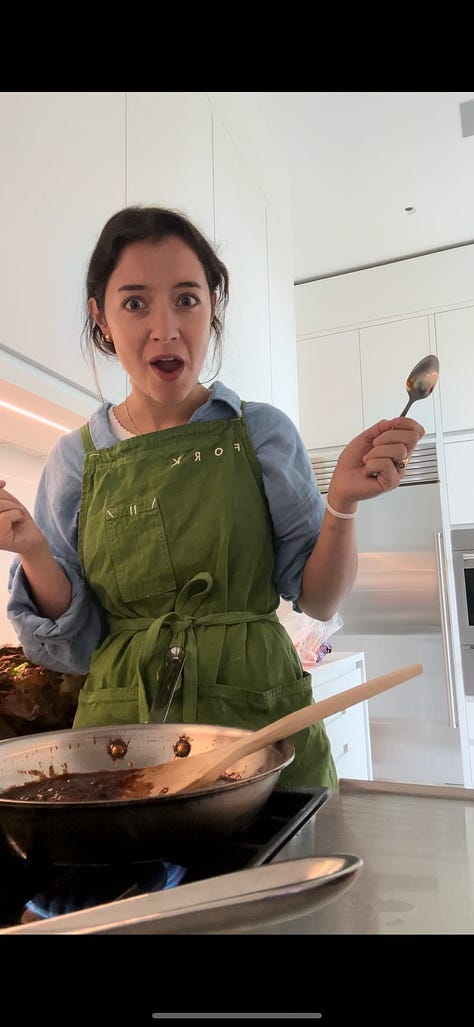
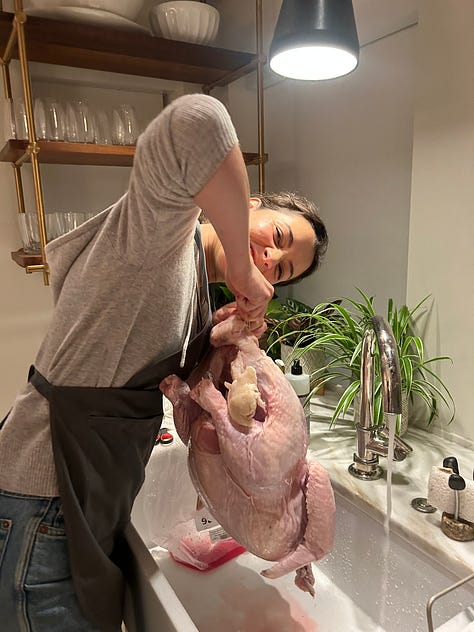
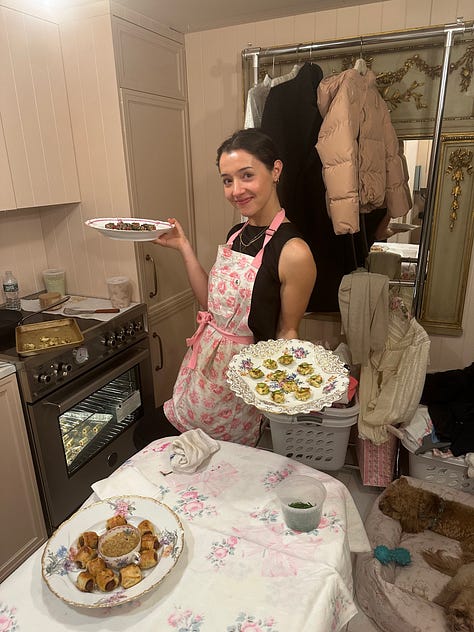
The Day of
Prep what you can before
If you can prep sauces, dressings, or even partial components in your own space, do it. It’ll shave time off your list and give you one less thing to worry about when you’re in a new kitchen, trying to find a whisk.
Bring Your Own Gear
Your knife roll should contain all the essentials you’ll need to prepare the meal: peeler, microplane, fish spatula, tweezers, offset spatula, you name it. If you anticipate needing bigger equipment (things like blenders, food processors, and stand mixers), I like to check with the client ahead of time to confirm what they have. Again, never assume.
And don’t forget the humble oven thermometer. Ovens in private homes are notoriously unreliable. What reads as 400°F might actually be 350°F or 425°F… and suddenly your tapping your foot waiting for the potatoes to get crispy as the dinner time creeps up on you.
I made a little list of everything I pack in my knife roll, plus my favorite aprons (shoutout Whitebark Workwear) and cheffing clogs.
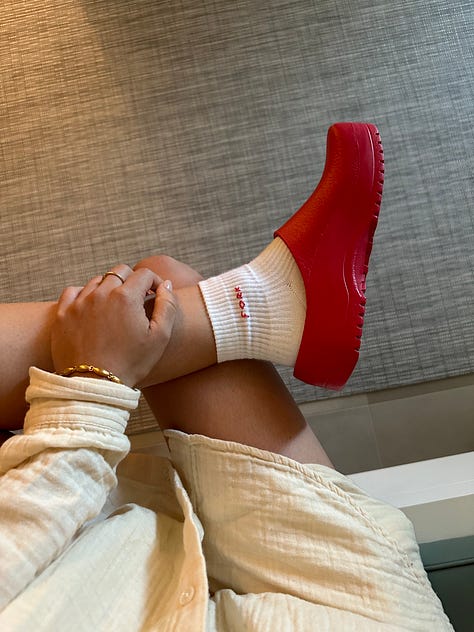
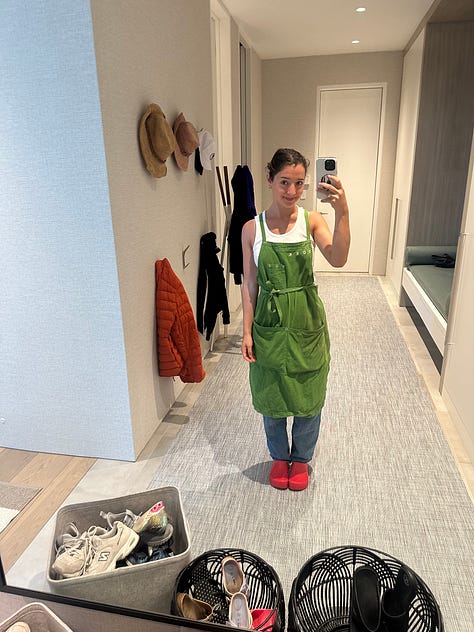
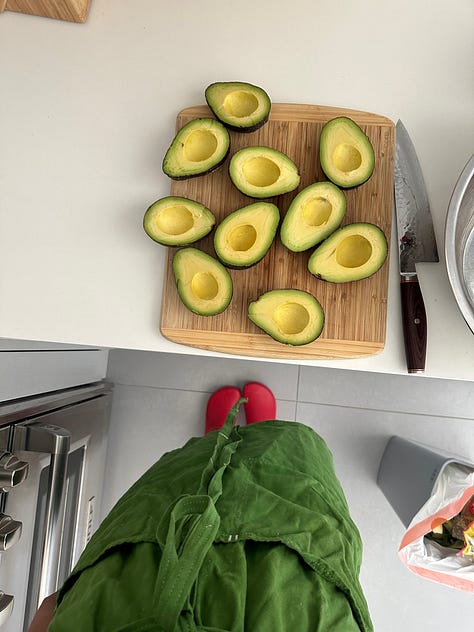
You’ll likely bring all of the ingredients you need to prepare the meal, but don’t forget about the pantry staples you are used to having on hand in your own kitchen that don’t make it on to the grocery list. Things like your preferred olive oil, vinegars, spices, and even salt! You’re probably used to cooking with Diamond Crystal, yes? Not everyone has this and god forbid you’re working with Morton Iodized…
Finally, I like to have bandaids on hand in case of a nervous knife slip and food service gloves for plating.
Arrive Early
I usually aim to arrive at least one hour before I “need” to. New kitchens are always a bit of a scavenger hunt. That hour gives you buffer time to find your rhythm.
Make a Prep List and Work Backwards
I never walk into a trial without a written prep list and timeline. And lucky for you I designed my own private chef planning template on notion (this is legitimately what I use myself) to stay organized. It will prompt you on everything to think through and it’s free!!!
If dinner is at 7PM, I plan backwards:
Plating by 6:55
Steaks resting by 6:50
Sides finishing at 6:45
Searing at 6:40
Having your timing thought through in advance can be the difference between a stressful dinner and a smooth, professional service.
Double-Check Dinner Time
Never assume (I’m a broken record!!!) the time they tell you is the actual dinner time. If they say 7 pm, that might mean guests won’t sit until 8. Or maybe you’re plating for kids at 6:30 pm and adults at 7. Ask again when you get there. Clarify what the real plan is so you’re not standing there with perfectly rested steaks while the whole family is still at tennis practice.
Serve with Confidence (Even if You’re Freaking Out)
Imposter syndrome always shows up like an uninvited plus-one. Even now, after multiple gigs and actual clients who keep rebooking me, I still hear that voice saying, “You don’t know what you’re doing.”
But here’s the thing: you are the expert in the room. The clients are not chefs. You are.
If your sauce is slightly thicker than you hoped, don’t lead with that. Say: “Here’s a roasted garlic béarnaise, emulsified with a touch of brown butter for added richness.” They’ll never know. If the carrots got a little extra crisp in the oven? “Crispy roasted carrots, picked up from the farm market this morning, finished with thyme and flaky salt.”
Say it like you mean it. It makes all the difference.
Read the Room
Some clients want to chat and ask about your process. Others prefer formality and silence. Match their energy. You’re in their home, but you’re also observing what kind of people they are — which brings me to…
You’re Interviewing Them Too
Yes, they’re deciding if they want to hire you. But you should be deciding whether you want to be hired. Are they respectful? How do they treat their staff (if they have staff)? How do they treat you?
Ask questions, even quietly in your head:
Do I like this vibe?
Would I be excited to come here every day?
Do the staff seem to enjoy working here?
Trust your gut. If something feels off, it probably is.
That’s all I got for you today. YOU GOT THIS!
For more information about culinary school, how I got into private cheffing and more, check out my past posts:
Forklore is a reader-supported publication. If you liked this post, consider subscribing (or even paying!!!) so I can continue to share more behind-the-scenes of private cheffing, culinary life, and everything in between.
chat soon,
Maddy




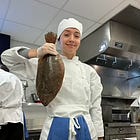

why was this so captivating even if i have no private cheffing experience or desire for it lol. i love the way that you write!!!!
lol your expressions in some of these pics… I’d hire you